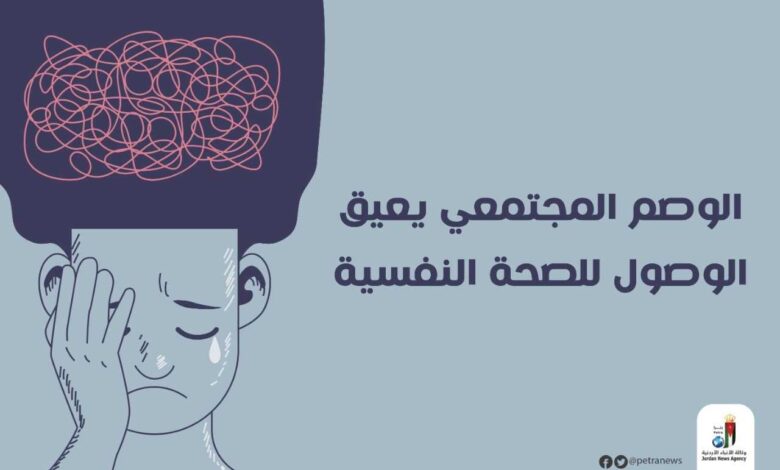
الوصمة في الأعراض النفسية
Stigma in psychological symptoms
Mental illness carries a stigma that can make it difficult for those who suffer from it to seek help. In fact, many people with mental illness do not seek help because they are afraid of the stigma.
The stigma of mental illness can also make it difficult for people to get the help they need.
Maintaining mental health is essential to overall well-being,
but unfortunately, mental illness is often shrouded in stigma. People with mental illness often experience discrimination in many areas of their lives, including in employment, housing, and social interactions.
The stigma attached to mental illness can make it difficult for people to seek out treatment and support, which can then lead to further deterioration in mental health.
It is therefore important to increase awareness of mental illness and reduce the stigma surrounding it.
It’s not uncommon for people to experience some form of mental illness. In fact,
according to the National Alliance on Mental Illness (NAMI),
about one in five adults in the United States experiences a mental illness in a given year. Mental illness can take many forms and can range from mild to severe. Despite how common mental illness is, there is still a lot of stigma surrounding it.
Psychological symptoms are often viewed as a source of stigma and discrimination. People with mental illness may be seen as dangerous, unpredictable,
or incapable of functioning in society.
This can lead to social isolation, employment discrimination, and difficulty accessing mental health services. The stigma surrounding mental illness can make it hard for people to seek help, leading to delays in diagnosis and treatment.
Despite its prevalence, mental illness is often stigmatized by society. For many people, mental illness is seen as a sign of weakness or instability.
This stigma can make it difficult for people with mental illness to seek out the help they need. Additionally, the stigma around mental illness can make it difficult for people to talk about their symptoms or experiences with others.
الوصمة في الأعراض النفسية
يحمل المرض العقلي وصمة عار قد تجعل من الصعب على من يعانون منه طلب المساعدة. في الواقع ، لا يطلب الكثير من المصابين بمرض عقلي المساعدة لأنهم يخافون من وصمة العار.
يمكن أن تجعل وصمة المرض النفسي من الصعب على الأشخاص الحصول على المساعدة التي يحتاجون إليها. يعد الحفاظ على الصحة العقلية أمرًا ضروريًا للرفاهية العامة ، ولكن لسوء الحظ ، غالبًا ما يكتنف المرض النفسي وصمة العار.
غالبًا ما يعاني الأشخاص المصابون بمرض عقلي من التمييز في العديد من مجالات حياتهم ، بما في ذلك التوظيف والإسكان والتفاعلات الاجتماعية.
يمكن أن تجعل وصمة العار المرتبطة بالمرض النفسي من الصعب على الناس التماس العلاج والدعم ، مما قد يؤدي بعد ذلك إلى مزيد من التدهور في الصحة العقلية. لذلك من المهم زيادة الوعي بالمرض العقلي وتقليل الوصمة المحيطة به. ليس من غير المألوف أن يعاني الناس من شكل من أشكال المرض العقلي.
في الواقع ، وفقًا للتحالف الوطني للأمراض العقلية (NAMI) ، يعاني واحد من كل خمسة بالغين في الولايات المتحدة من مرض عقلي في عام معين.
يمكن أن يتخذ المرض العقلي أشكالًا عديدة ويمكن أن يتراوح من خفيف إلى شديد. على الرغم من انتشار المرض العقلي ، لا يزال هناك الكثير من وصمة العار المحيطة به.
غالبًا ما يُنظر إلى الأعراض النفسية على أنها مصدر للوصمة والتمييز.
قد يُنظر إلى الأشخاص المصابين بمرض عقلي على أنهم خطرون أو غير متوقعين أو غير قادرين على أداء وظائفهم في المجتمع. يمكن أن يؤدي ذلك إلى العزلة الاجتماعية والتمييز في العمل وصعوبة الوصول إلى خدمات الصحة العقلية.
يمكن أن تجعل وصمة العار المحيطة بالمرض العقلي من الصعب على الناس طلب المساعدة ، مما يؤدي إلى التأخير في التشخيص والعلاج. على الرغم من انتشار المرض العقلي ،
إلا أنه غالبًا ما يوصم به المجتمع. بالنسبة للعديد من الأشخاص ، يُنظر إلى المرض العقلي على أنه علامة ضعف أو عدم استقرار.
يمكن أن تجعل هذه الوصمة من الصعب على الأشخاص المصابين بمرض عقلي التماس المساعدة التي يحتاجون إليها. بالإضافة إلى ذلك ،
فإن وصمة العار المتعلقة بالمرض العقلي يمكن أن تجعل من الصعب على الناس التحدث عن أعراضهم أو تجاربهم مع الآخرين.




